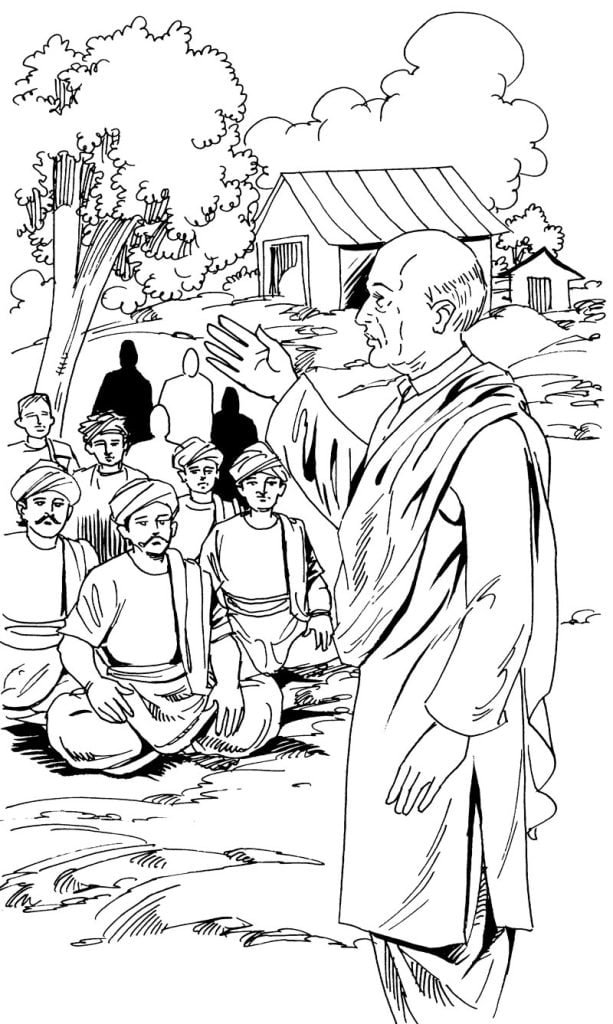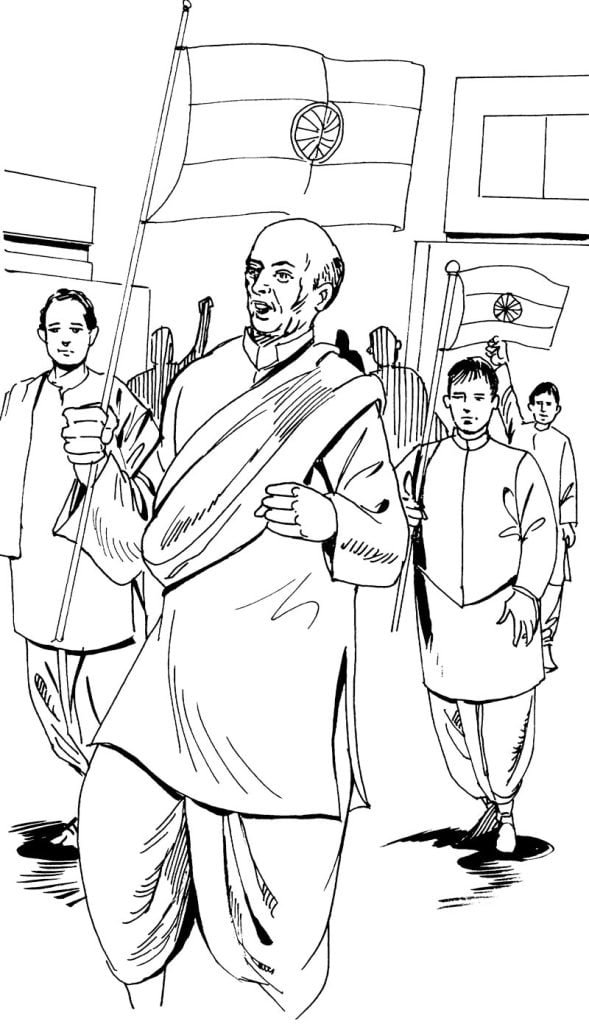Vallabhbhai now agreed with Gandhiji that non-cooperation was the only answer to British cruelties. The Congress session was held on 4th September 1920 to pass the non-cooperation resolution under the leadership of Lala Lajpat Rai. Due to the success of Kaira Satyagraha, the popularity of Vallabhbhai was an hot issue of the resolution. Vallabhbhai rushed to Calcutta to convass for non-cooperation. Gandhiji praised Vallabhbhai for his efforts in front of Congress representatives came from all over the country. Thanks to his effort and the influence of Gandhiji the non-cooperation resolution was passed by 1852 to 908 votes. This was later ratified by the regular session of the Congress held at Nagpur in December. The resolution advised people to accept non-cooperation as the creed of the Congress. People could non-cooperate with the government by giving up government services, government schools, government titles and boycotting foreign cloth, elections to legislatures and law-court.
Now the main aim of the leaders were to set free our country from the clutches of British government. Now they want such type of youth leaders, who can increase the morale of people by their firm intention and to threw out the inferiority complex from within and to raise such type of ‘Do & Die’ slogan which can shake the roots of British Government and they compelled to leave our country.
It was decided at the session to start civil disobedience movement on a mass scale and it was left to Gandhiji to decide when and where the campaign should be launched. The final choice of the area where Gandhiji would lead the movement was between Anand in Kaira district and Bardoli in Surat district. Vallabhbhai, to when Gandhiji had left the choice, picked Bardoli. He did so primarily because the Bardoli Patidars, upon whom the success of the campaign depended, were less ridden with dissensions than the Patidars in Anand. He also felt that people of Bardoli were gentle and mild and would not resort to violence when provoked.
He along with Gandhiji travelled over the entire district of Bardoli to educate them. They had to rouse the people’s enthusiasm and yet keep their passions from breaking into violence. Their utterances charged the people. The people responded enthusiastically. But only a few days after, Gandhiji learnt about the outbreak of violence at Chauri-Chaura. The police had opened fire on a peaceful procession without any provocation and the mob retaliated by setting fire to the police station and burning to death 21 constables and one young son of Sub-Inspector of police. Learning this Gandhiji immediately called-off civil disobedience for he felt that the nation was not yet ready for non-violent non-cooperation. The working committee of Congress ratified Gandhiji’s decision to stop non-cooperation.

Gandhiji was arrested in March 1922 and jailed for two years. Many leaders including C.R. Das, Motilal Nehru and Lala Lajpat Rai resented the suspension of the movement when it was at its peak. They called it Gandhiji’s greatest blunder and protested vehemently against “the ignominious and ill-turned retreat”. Vallabhbhai however felt that Gandhiji was right in suspending civil disobedience. He told the people not to question their leader but to follow him. To quote him, “During the struggle do what Gandhiji commands us, if he asks us to rise we shall rise, if he asks us to retreat we shall do so”.
Vallabhbhai told to people—“We are not defeated. Our agitation had been stopped for some time so that the emerging situations could favour us and we shall be able to defeat them. So please do throw out your desperation. All of you get ready for next round of arrangements. We had to fight with the reknowned English empire. We had to undergo severe test if we want freedom. In this we can also loose our big leaders and we have to be fully prepared for it. At last we will surely threw the British out and emerge victorious.

After the arrest of Gandhiji, a wave of darkness spread everywhere. The morale of people started sinking. But Vallabhbhai tried his level best to boost their morale. He told the people to unite. He had a long tour of Gujarat where he taught people the lesson of unity and to have patience.
On 1st December 1922 Vallabhbhai went on a strike against the use of foreign clothes in Ahmedabad’s cloth market. Under his leadership many Congress leaders started raising slogans against the use of foreign clothes. On the other hand the British government tried best to build a sense of frustation among the people by spreading the failure of Satyagraha movement and the arrest of Gandhiji. They wanted the people’s attention to be deviated from Gandhiji. They used their full strength to break riots between Hindus and Muslims and to disunite them and they also became successful in it. The whole country was engripped into communal hatred. The Congress leaders toured the whole country to stop the fire of hatred. They opened the eyes of the people and told them the motive of the British government. Vallabhbhai told to people—
The British government wanted that we should fight with each other; but we should have to be clever enough to know their motives. Their motive is to ‘Divide and Rule’. But we had to unite. We are dependent on them only because of our weaknesses. Our greatest weakness is disunity. Now we should never ever have to repeat our weakness. We have to use our intelligence so that we can defeat their cruelty by our strength.
The bad game plotted by the British government had not became so much successful as they hoped for. Vallabhbhai and other Congress leaders had shattered their dreams. But after some days due to the suspension of the Satyagraha movement their arise a conflict between the Congress leaders. Due to conflict Congress was divided into two parts. The first was the ‘changers’ and the other was ‘no-changers’. The changers wanted to challenge directly to the British government. Prominent among them was Motilal Nehru, Chittranjan Das, Vithalbhai Patel, Subhash Chandra Bose and Hakim Afzal Khan. Whereas prominent among no-changers’ were S. Kastoori Ranga Aiyar, M.A. Ansari and Raj Gopalcharya. These people were fully against the continuous meetings.
Vallabhbhai’s saying was that Gandhiji is totally against continuous meetings. The government had already locked him behind bars. In such situation if we give validity to continuous meetings then the people will start opposing the Satyagraha movement. The unity and integrity of our country will be shattered and this will boost the morale of British. So we will go against the continuous meetings.

On the other Motilal Nehru, Chittranjan Das and Subhash Chandra Bose being not happy, made their new ‘Swaraj Party’. This party made their best to apply the policies of ‘Changers’. Seeing this Vallabhbhai said to the people of Gujarat—“In the absence of Gandhiji nobody will go against their ideology”. So following this message whole Gujarat became the centre of ‘no-changers’. Then Vallabhbhai tried his best to win the heart of Nehru, Chittranjan and he also became successful in it.
In March 1923, trouble arose over the issue of the national flag. The working committee of the Nagpur District Congress fixed 1st May 1923 as the date for the beginning of an organised protest against the government’s interference with the right to carry the national flag publicly in Nagpur. A press communique issued by the local government had been published in the ‘Hita Vada’ which stated the government stand in the matter. The most influential Britons lived in the Civil Lines area and it was here that government forbade the carrying of the national flag. On 30th April, the Congress leaders published a route that they intended to take and on 1st May the Nagpur flag Satyagraha began formally. Day after day, several volunteers carried the flag along the prescribed route, in defiance of the district magistrate’s orders, submitted themselves for arrest and pleaded guilty before the magistrate and received sentences of two or sometimes, three months rigorous imprisonment or one month simple imprisonment u/s 143 and 188 respectively of Indian Penal Code. This became the city’s daily tamasha and people went to witness it as they would see a show.
Next Borsad claimed the attention of Vallabhbhai. It has his Taluka and it appealed to him for help. This taluka was infested with dacoits and robbers. Naturally this was going on with the connivance of the police. But the police attributed it to the indifference and cowardliness of the people who did not cooperate with the police. To set matters right a special force was posted in the taluka and the people were asked to pay Rs 2,40,000 a year which worked out at Rs 2 and annas 7 per person above the age of 16. People resented this punitive tax.
Vallabhbhai himself went to Borsad and found that the superintendent of police was himself involved. He had issued a confidential circular to all the sub-inspectors and head constables “requiring them to turn a blind eye to dacoites and offences committed by them”. The people had even supplied weapons to all with which they committed many murders and dacoities. Vallabhbhai exhorted the people not to pay this punitive tax and at the same time to remain non-violent against all provocations.
The people of Borsad stood firm. The police reacted with vengeance and attached property. This went on for five weeks when Sir Leslie Wilson was appointed Governor of Bomaby. He happened to see in a newspaper a report of Vallabhbhai’s speech in which he had quoted that confidential letter. He deputed the home member to visit the place and find out the facts. The home member confirmed that Vallabhbhai’s allegations were correct. Thereupon the punitive tax was abolished, extra cost of extra police was to borne by the government. Vallabhbhai thanked the governor of Bombay for this gesture of the home member. Gandhiji complemented Vallabhbhai by conferring on him the title of ‘King of Borsad’.
